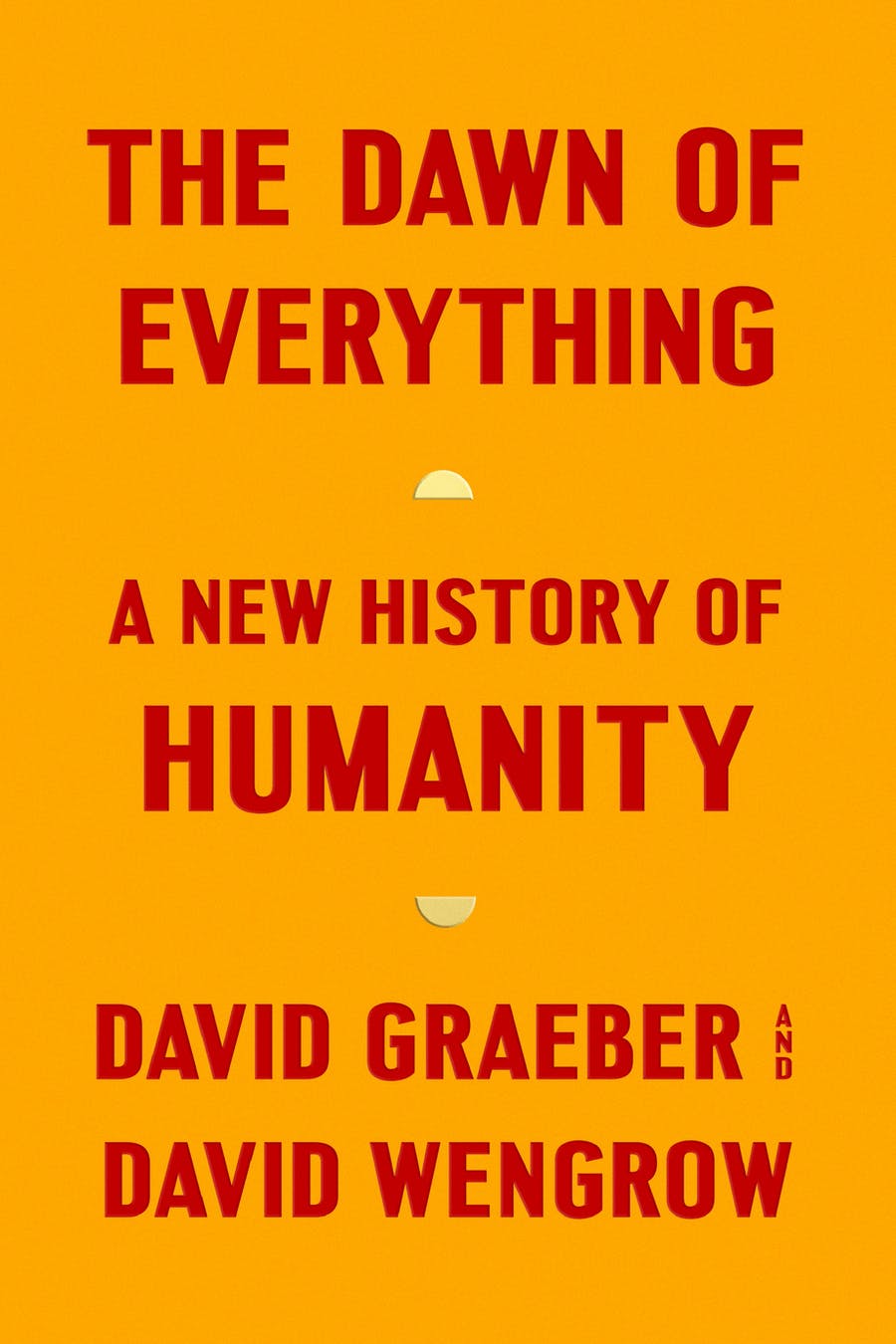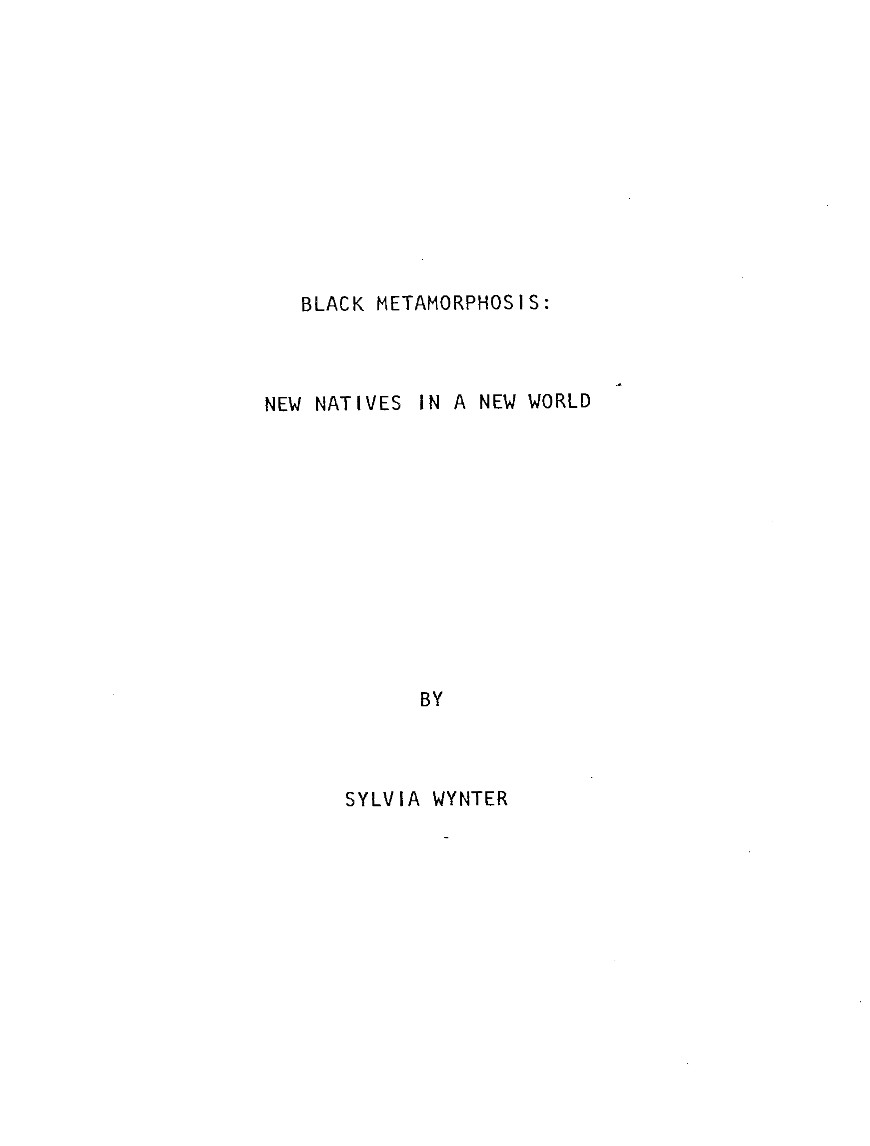David Graeber, David Wengrow: The Dawn of Everything: A New History of Humanity (2021)
Filed under book | Tags: · agriculture, bureaucracy, city, critique, history, human, indigenous peoples, politics, production, progress, property, sovereignty

“For generations, our remote ancestors have been cast as primitive and childlike–either free and equal innocents, or thuggish and warlike. Civilization, we are told, could be achieved only by sacrificing those original freedoms or, alternatively, by taming our baser instincts. David Graeber and David Wengrow show how such theories first emerged in the eighteenth century as a conservative reaction to powerful critiques of European society posed by Indigenous observers and intellectuals. Revisiting this encounter has startling implications for how we make sense of human history today, including the origins of farming, property, cities, democracy, slavery, and civilization itself.
Drawing on research in archaeology and anthropology, the authors show how history becomes a far more interesting place once we learn to throw off our conceptual shackles and perceive what’s really there. If humans did not spend 95 percent of their evolutionary past in tiny bands of hunter-gatherers, what were they doing all that time? If agriculture, and cities, did not mean a plunge into hierarchy and domination, then what kinds of social and economic organization did they lead to? The answers are often unexpected, and suggest that the course of human history may be less set in stone, and more full of playful, hopeful possibilities, than we tend to assume.”
Publisher Farrar, Straus and Giroux, November 2021
ISBN 9780374157357, 0374157359
xii+692 pages
Reviews: William Deresiewicz (The Atlantic, 2021), Giulio Ongaro (Jacobin/Tribune, 2021), Jennifer Schuessler (The New York Times, 2021), Kwame Anthony Appiah (The New York Review, 2021), David Priestland (The Guardian, 2021), Emily Kern (Boston Review, 2021), Steve Rushton (Bella Caledonia, 2021), George Scialabba (New Republic, 2021), Chris Knight, Nancy Lindisfarne and Jonathan Neale (Monthly Review, 2021), Tunku Varadarajan (Wall Street Journal, 2021), Erle C. Ellis (Science, 2021), Peter Isackson (Fair Observer, 2021), Noah Berlatsky (NBC News, 2021), Annalee Newitz (Washington Post, 2021), Matthew Porges (LA Review of Books, 2022), Richard Handler (TLS, 2022), anon. (Astral Codex Ten, 2022), Milena Bartlová (A2larm, 2022, CZ), Joe Gill (Middle East Eye, 2023), Jan Bělíček, Eva Klíčová (Alarm, podcast, 2024, CZ), more.
Book website
Publisher
WorldCat
Feral Atlas: The More-Than-Human Anthropocene (2020)
Filed under online resource | Tags: · animal, anthropocene, art, ecology, environment, human, infrastructure

“Feral Atlas invites you to explore the ecological worlds created when nonhuman entities become tangled up with human infrastructure projects. Seventy-nine field reports from scientists, humanists, and artists show you how to recognize “feral” ecologies, that is, ecologies that have been encouraged by human-built infrastructures, but which have developed and spread beyond human control. These infrastructural effects, Feral Atlas argues, are the Anthropocene.
Playful, political, and insistently attuned to more-than-human histories, Feral Atlas does more than catalog sites of imperial and industrial ruin. Stretching conventional notions of maps and mapping, it draws on the relational potential of the digital to offer new ways of analyzing—and apprehending—the Anthropocene; while acknowledging danger, it demonstrates how in situ observation and transdisciplinary collaboration can cultivate vital forms of recognition and response to the urgent environmental challenges of our times.”
Curated and Edited by Anna L. Tsing, Jennifer Deger, Alder Keleman Saxena and Feifei Zhou
Publisher Stanford University Press, 2020
ISBN 9781503615045, 1503615049
Sylvia Wynter: Black Metamorphosis: New Natives in a New World [1970s]
Filed under manuscript | Tags: · black people, body, caribbean, colonialism, critique, human, humanism, politics, resistance, slavery, theory

“Black Metamorphosis: New Natives in a New World is an unpublished manuscript written by Sylvia Wynter. The work is a seminal piece in Black Studies and uses diverse fields to explain Black experiences and presence in the Americas.
Throughout the 1970s and early 1980s, Wynter worked with the Center for Afro-American Studies (CAAS) at the University of California, Los Angeles (UCLA) to complete the project which was to be published by the Institute of the Black World. The manuscript presents early iterations of Wynter’s Theory of the Human and explores how Black experiences are essential to understanding the history of the New World.”
The only part of this manuscript that has been published is Wynter’s 1979 essay “Sambos and Minstrels”, though excerpts of and allusions to many of the other texts she wrote in the 1970s can be found in the manuscript, particularly “Jonkonnu in Jamaica” (1970), “Novel and History” (1971), “Ethno or Socio Poetics” (1976), “The Politics of Black Culture” (1977), and “In Quest of Matthew Bondman” (1981). … In the final 935-page manuscript, the page numbers break at page 251 and resume with page 370. The 120 missing pages correspond exactly to the number of pages in a series of descriptions of revolts by enslaved persons in Jamaica, and it appears that they were meant to be inserted at this point in the text.” (Kamugisha 2016)
Manuscript, written throughout the 1970s
[935] pages (252-369 missing)
Commentary and analysis: Derrick White (C.L.R. James Journal, 2010), Aaron Kamugisha, Demetrius L. Eudell, Greg Thomas, Katherine McKittrick, Tonya Haynes, Nijah Cunningham (Small Axe, 2016).
PDF (21 MB)
Comment (0)
